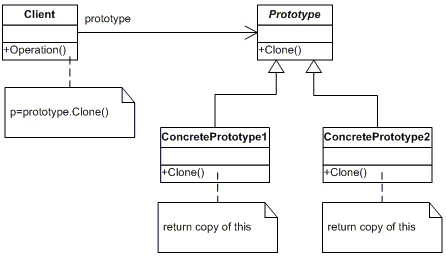设计模式——原型模式
原型模式(Prototype),用原型实例指定创建对象的种类,并且通过拷贝这些原型创建新的对象。
原型模式其实就是从一个对象再创建另外一个可定制的对象,而且不需求知道任何创建的细节。
clone() 方法是这样的:如果字段是值类型的,则该字段执行逐位复制,如果字段是引用类型的,则复制引用但不复制引用的对象 ;
因此,原始对象及其引用同一对象。
浅复制:被复制对象的所有变量都含有与原来的对象相同的值,而所有的对其他对象的引用都仍然指向原来的对象。
深复制:把引用对象的变量指向复制过的新对象,而不是原有的被引用的对象。
类图:

实例一:浅拷贝
public class Prototype implements Cloneable {
private String name;
public String getName() {
return name;
}
public void setName(String name) {
this.name = name;
}
public Object clone() {
try {
return super.clone();
} catch (CloneNotSupportedException e) {
e.printStackTrace();
return null;
}
}
}
public class TestMain {
public static void main(String[] args) {
testPrototype();
}
private static void testPrototype(){
Prototype pro = new Prototype();
pro.setName("original object");
Prototype pro1 = (Prototype)pro.clone();
pro.setName("changed object1");
System.out.println("original object:" + pro.getName());
System.out.println("cloned object:" + pro1.getName());
}
}
结果:
original object:changed object1
cloned object:original object
实例二: 浅拷贝
public class Prototype{
private String name;
public String getName() {
return name;
}
public void setName(String name) {
this.name = name;
}
}
public class NewPrototype implements Cloneable {
private String id;
public String getId() {
return id;
}
public void setId(String id) {
this.id = id;
}
private Prototype prototype;
public Prototype getPrototype() {
return prototype;
}
public void setPrototype(Prototype prototype) {
this.prototype = prototype;
}
public Object clone(){
try {
return super.clone();
} catch (CloneNotSupportedException e) {
e.printStackTrace();
return null;
}
}
}
public class TestMain {
public static void main(String[] args) {
// TODO Auto-generated method stub
testPrototype();
}
private static void testPrototype(){
Prototype pro = new Prototype();
pro.setName("original object");
NewPrototype newObj = new NewPrototype();
newObj.setId("test1");
newObj.setPrototype(pro);
NewPrototype copyObj = (NewPrototype)newObj.clone();
copyObj.setId("testCopy");
copyObj.getPrototype().setName("changed object");
System.out.println("original object id:" + newObj.getId());
System.out.println("original object name:" + newObj.getPrototype().getName());
System.out.println("cloned object id:" + copyObj.getId());
System.out.println("cloned object name:" + copyObj.getPrototype().getName());
}
}
结果:
original object id:test1
original object name:changed object
cloned object id:testCopy
cloned object name:changed object
实例三: 深拷贝
public class Prototype implements Cloneable {
private String name;
public String getName() {
return name;
}
public void setName(String name) {
this.name = name;
}
public Object clone() {
try {
return super.clone();
} catch (CloneNotSupportedException e) {
e.printStackTrace();
return null;
}
}
}
public class NewPrototype implements Cloneable {
private String id;
public String getId() {
return id;
}
public void setId(String id) {
this.id = id;
}
private Prototype prototype;
public Prototype getPrototype() {
return prototype;
}
public void setPrototype(Prototype prototype) {
this.prototype = prototype;
}
public Object clone(){
NewPrototype ret = null;
try {
ret = (NewPrototype)super.clone();
ret.prototype = (Prototype)this.prototype.clone();
return ret;
} catch (CloneNotSupportedException e) {
e.printStackTrace();
return null;
}
}
}
public class TestMain {
/**
* @param args
*/
public static void main(String[] args) {
testDeepCopy();
}
private static void testDeepCopy(){
Prototype pro = new Prototype();
pro.setName("original object");
NewPrototype newObj = new NewPrototype();
newObj.setId("test1");
newObj.setPrototype(pro);
NewPrototype copyObj = (NewPrototype)newObj.clone();
copyObj.setId("testCopy");
copyObj.getPrototype().setName("changed object");
System.out.println("original object id:" + newObj.getId());
System.out.println("original object name:" + newObj.getPrototype().getName());
System.out.println("cloned object id:" + copyObj.getId());
System.out.println("cloned object name:" + copyObj.getPrototype().getName());
}
}
结果:
original object id:test1
original object name:original object
cloned object id:testCopy
cloned object name:changed object
实例四: 利用串行化来做深复制
把对象写道流里的过程是串行化(Serilization)过程;把对象从流中读出来是并行化(Deserialization)过程. 写在流里的是对象的一个拷贝,然后再从流里读出来重建对象.
public class PrototypeSe implements Serializable {
private String name;
public String getName() {
return name;
}
public void setName(String name) {
this.name = name;
}
}
public class NewPrototypeSe implements Serializable {
private String id;
public String getId() {
return id;
}
public void setId(String id) {
this.id = id;
}
private PrototypeSe prototype;
public PrototypeSe getPrototype() {
return prototype;
}
public void setPrototype(PrototypeSe prototype) {
this.prototype = prototype;
}
public Object deepClone(){
try {
ByteArrayOutputStream bo = new ByteArrayOutputStream();
ObjectOutputStream oo = new ObjectOutputStream(bo);
oo.writeObject(this);
ByteArrayInputStream bi = new ByteArrayInputStream(bo.toByteArray());
ObjectInputStream oi = new ObjectInputStream(bi);
return oi.readObject();
} catch (IOException | ClassNotFoundException e) {
// TODO Auto-generated catch block
e.printStackTrace();
return null;
}
}
}
public class TestDeepClone {
public static void main(String[] args) {
// TODO Auto-generated method stub
PrototypeSe po = new PrototypeSe();
po.setName("test1");
NewPrototypeSe se = new NewPrototypeSe();
se.setPrototype(po);
NewPrototypeSe deepClone = (NewPrototypeSe)se.deepClone();
deepClone.getPrototype().setName("test2");
System.out.println("original name:" + se.getPrototype().getName());
System.out.println("cloned name:" + deepClone.getPrototype().getName());
}
}
结果:
original name:test1
cloned name:test2